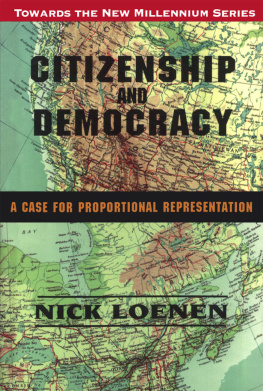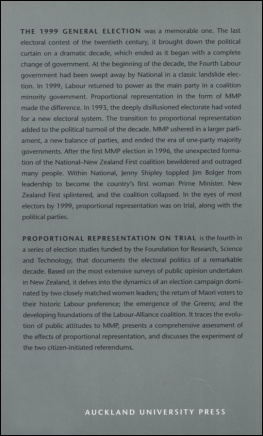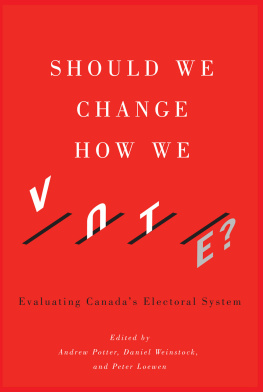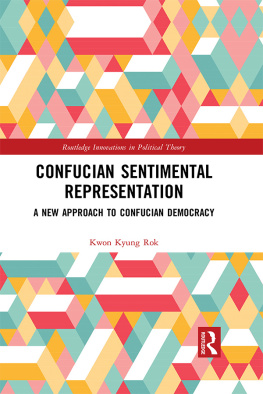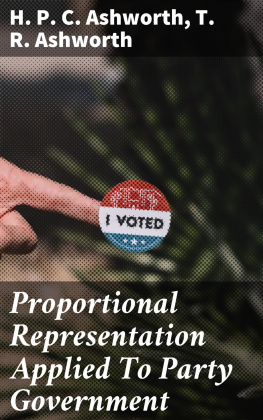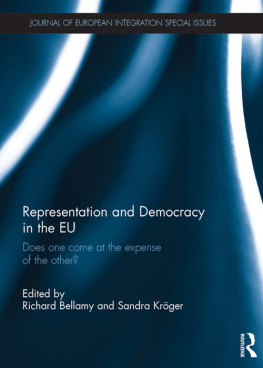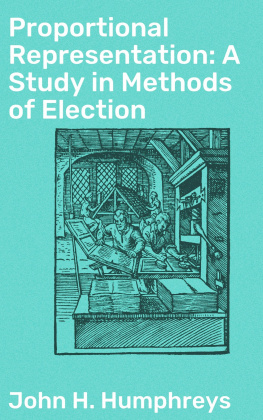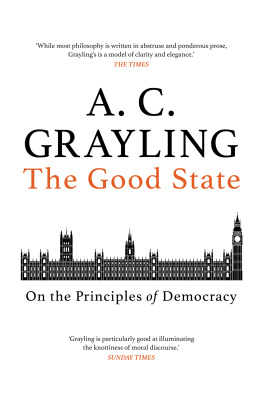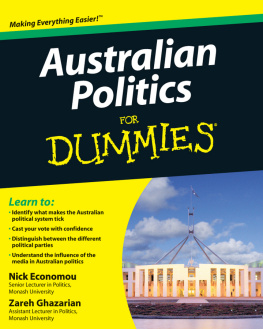CITIZENSHIP AND DEMOCRACY
A CASE FOR PROPORTIONAL REPRESENTATION
CITIZENSHIP AND DEMOCRACY
A CASE FOR PROPORTIONAL REPRESENTATION
NICK LOENEN
Copyright Nick Loenen 1997
All rights reserved. No part of this publication may be reproduced, stored in a retrieval system, or transmitted in any form or by any means, electronic, mechanical, photocopying, recording, or otherwise (except for brief passages for purposes of review) without the prior permission of Dundurn Press Limited. Permission to photocopy should be requested from the Canadian Reprography Collective.
Editor: Doris Cowan
Designer: Sebastian Vasile
Printer: Best Book Manufacturers
Canadian Cataloguing in Publication Data
Loenen, Nick
Citizenship and democracy
(Towards the new millennium series)
Includes bibliographical references.
ISBN 1-55002-280-6
1. Proportional representation - Canada. 2. British Columbia. Legislative Assembly -Reform. 3. Canada. Parliament - Reform I. Title. II. Series.
JL167. L63 1997 328.33470971 C96-932421-9
1 2 3 4 5 BJ 01 00 99 98 97
The publisher wishes to acknowledge the generous assistance of the Canada Council, the Book Publishing Industry Development Program of the Department of Canadian Heritage, and the Ontario Arts Council.
Care has been taken to trace the ownership of copyright material used in this book. The author and the publisher welcome any information enabling them to rectify any references or credit in subsequent editions.
Printed and bound in Canada.
Printed on recycled paper.

Dundurn Press
2181 Queen Street East
Suite 301
Toronto, Ontario, Canada
M4E 1E5
Dundurn Press
73 Lime Walk
Headington, Oxford
England
OX3 7AD
Dundurn Press
250 Sonwil Drive
Buffalo, NY
U.S.A. 14225
TABLE OF CONTENTS
ACKNOWLEDGEMENTS
W hen and where did this work start? Where is the start of anything? When and where does a person begin? This study is my work, but the seeds were sown long ago. Perhaps by a mother who instilled self-confidence, and a father who was educated without the benefit of much schooling. He fought an oppressive social order to establish workers rights, and resisted National Socialism so that persons might be free. Perhaps it started with my maternal grandfather, a day labourer who in the 1890s walked with a wheelbarrow from Nieuw Loosdrecht to Amsterdam (thirty-five kilometres as the crow flies) to purchase books. He and his friends in the Young Mens Christian Society would study the books he brought back and debate the meaning of existence. Where is the beginning of anything? Did the idea for this book start during my five years on the back bench, as I grew more and more aware with each passing year that all decisions of importance are made outside the legislature, and that power is concentrated exclusively at the top?
This study owes much to the inspiration that came from my parents and grandfather, and from many others. Much of the work is based on a masters degree thesis, which took shape under the professional and watchful eye of my adviser, Paul Tennant, and benefited from the helpful suggestions of other members of UBCs Political Science faculty, especially Ken Carty and Alan Cairns.
Marilyn Zuidhof-Loenen and Jeff Loenen helped with the initial editing of the manuscript, which Doris Cowan of Dundurn Press polished into a most readable text. George Gibault, who combines practical political instinct with a love of history and political philosophy, offered penetrating commentary. Their enthusiastic support and helpful suggestions were much appreciated. My research was also generously assisted by the library staff at UBC and the legislative library in Victoria.
Finally, without my wife Jaynes tolerance for my strange, unsociable working habits, this work would not exist. I am grateful to all of these persons, and many not mentioned, for being part of my life. They all helped shape this project.
FOREWORD
BREAKOUT TO DEMOCRACY
by Patrick Boyer, Q.C.
T he real limitations of Canadian political practices and institutions of government lie not only in their often paltry and confused outcomes, but more profoundly in the inherent incapacity of the structure as it currently exists to deliver anything close to what a modern, democratic, pluralistic society requires.
It is in that context that this book provides a masterly systems analysis of a major flaw in the relationship between what we as Canadian citizens expect from our democratic institutions and procedures, and what they actually deliver to us.
Nick Loenen not only examines the perverse shortcomings of the voting system, but he does so in the context of Canadian political culture and democratic values. The result is a book that provides not only information, but understanding.
Voting systems are an integral component in the equation of our political democracy: freedom of expression plus the right to vote plus the availability of choice between parties plus a fair and free election process equals a representative legislature and accountable government. Right? Not necessarily.
This equation of democracy leads to different outcomes, depending, as with any equation, upon the variables - such as which voting system is introduced into it. If all other elements of free and fair democratic elections are held constant, but we remove one kind of voting system (such as our so-called first-past-the-post plan) and replace it with another (such as the proportional voting method), the results will be different.
A voting system which proportionately allocates votes among candidates in a way that more accurately reflects the actual weight of voting preferences expressed by the electorate has tremendous importance to any political society which considers itself, as we Canadians do, to be democratic.
Citizenship and Democracy makes clear, however, that a much richer harvest awaits us with the use of a saner voting system. More than just better numbers, there is also the potential for a dramatic qualitative improvement in the nature of democracy and accountability in Canada.
Why battle over fairness about where the constituency boundaries are drawn, or fight for the right to vote, or establish qualifying legal criteria for candidates who run for public office, or impose campaign spending limits, or worry about electoral broadcasting rules - if simultaneously we employ such a blunt system for calculating voting outcomes that it trivializes and even mocks these other refinements in our democratic electoral system?
The true nature of Canadas voting system is certainly not just an academic or theoretical topic. The outcomes of many recent Canada-wide and provincial elections would have been different - and consequently the make-up of the legislatures and the nature of the political agenda and legislative programs would also have displayed a more varied complexion - if proportional representation rules had been in operation.

